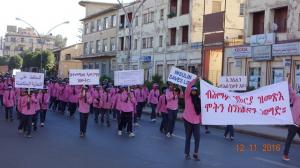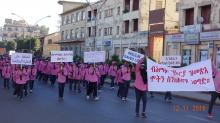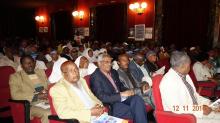Eritrea Commemorates World Diabetes Day 2016
Eritrea observed the World Diabetes Day 2016 at Cinema Roma on the 12 November 2016 in Asmara under the theme “Eyes on Diabetes”. The ceremony began with students parade from Bahtimeske to Cinema Roma with banners and caps featuring key messages of the day.
Different presentations and speeches were made on the day. Dr Goitom Mebrahtu, chairman of the Eritrean National Diabetes Association highlighted that diabetes is one of the most pressing health challenges world wide and he pledged to ensure that continual screening for diabetes is done in health facilities, for early detection.
On behalf of WHO, Mr Semere Ghebregiorgis, MPN/Officer –in –charge of WHO said that World Diabetes Day is a great opportunity to increase public awareness of diabetes and ways to prevent it. He added that includes regular screening, early diagnosis and equitable access to medicines and technologies to manage diabetes and its complications such as visual impairment and blindness.
Mr Semere emphasized that WHO will continue to provide technical support to Member States to develop their national policies, strategies and plans including scientific guidelines for the prevention and control of diabetes and other non-communicable diseases. He also thanked the diabetic Association of Eritrea and partners for their efforts in the fight against diabetes.
Furthermore, on behalf of MOH, Mr Mehari Woldu said that Eritrea is one of the few countries in the world that provides free insulin and treatment for diabetic patients.
Dr Kahsay Fessehatsion and Dr Habte Ghebremichael made extensive presentations on the effects of diabetes on eye and other organs. They said that over time diabetes can damage the heart, blood vessels, kidneys, and nerves besides the eye. The key message was that simple lifestyle measures are effective in preventing or delaying the onset of type 2 diabetes. If type 2 diabetes is to be prevented, the advice was that people should:
• achieve and maintain healthy body weight;
• be physically active – at least 30 minutes of regular, moderate-intensity activity on most days. More activity is required for weight control;
• eat a healthy diet, avoiding sugar and saturated fats intake; and
• avoid tobacco use as smoking increases the risk of diabetes and cardiovascular diseases.
At the event participants were invited to undergo free insulin screening. Posters and banners were displayed throughout the city and at the hall with messages on the importance of prevention and effective treatment of diabetes. All regions and hospitals also commemorated the day by conducting awareness raising campaigns. Moreover, dramas, general knowledge contest, lottery and songs were presented to the participants to understand the risk, prevention, control and treatment of diabetes; prizes were given to the participants.
Media campaigns were also organized throughout the week. In addition, Berhan Eye Hospital in Asmara was open to patients to come for free screening on the 14th of November.
Diabetes is a chronic disease that occurs either when the pancreas does not produce enough insulin or when the body cannot effectively use the insulin it produces. Insulin is a hormone that regulates blood sugar . Raised blood sugar is a common effect of uncontrolled diabetes and over time leads to serious damage to many of the body's systems, especially the nerves and blood vessels.
WHO aims to stimulate and support the adoption of effective measures for the surveillance, prevention and control of diabetes and its complications, particularly in low and middle-income countries.
Below:
01. Students marching on the street at Semotat Avenue in Asmara
02. Participants of the commemoration





